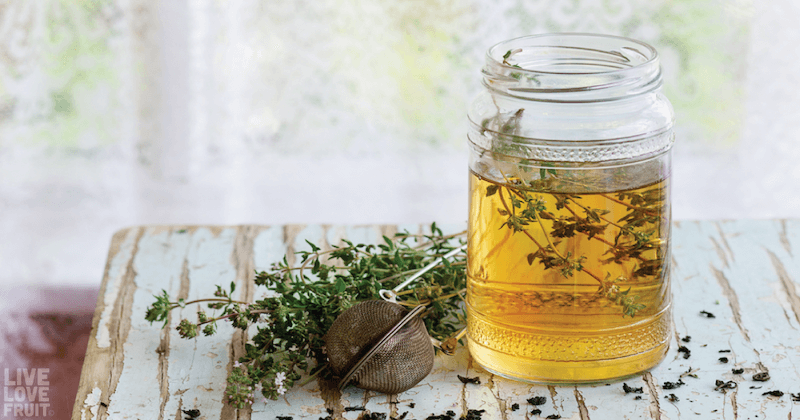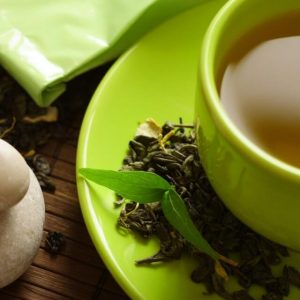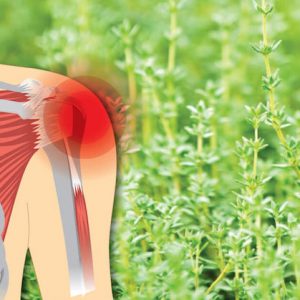There’s nothing nicer than sipping on a warm cup of tea in the morning. Better yet, what if that tea could heal things in your body that might otherwise be a little off?
Our tea-drinking ancestors utilized this tea and had the wisdom to recognize its value in healing the body from the inside out. That tea is thyme tea. It is otherwise known in the culinary field to add flavour to different dishes (like pea soup – one of my favourites!), but not many people know that you can also make tea with the herb, too.
Benefits of Thyme Tea
Thyme is delicate herb that contains potent anti-viral properties. It was used by Hippocrates, “The Father of Western Medicine,” for things like respiratory diseases and other lung-related conditions. During the 1340s, posies of thyme were worn for protection during the Black Death that swept across Europe.
Thyme has been traditionally used for treating bronchitis, whooping cough, sore throat (1), colic, parasitic worm infections (2) and skin disorders.
Nowadays, thyme is recognized for its amazing ability to reduce viral load in the body. This makes it highly beneficial for those suffering from fibromyalgia (3), Hashimoto’s, arthritis, lupus, multiple sclerosis, Epstein-Barr virus, shingles, hepatitis, influenza, herpes, HPV, chronic fatigue syndrome, thyroiditis, vertigo and tinnitus (4, 5, 6, 7).
The essential oil of thyme contains between 20-60% thymol – thyme’s most active ingredient. Surprisingly, this compound is used in Listerine mouthwash and Vicks VapoRub, because of its anti-bacterial and anti-fungal properties.
Thyme also contains ursolic acid and rosmarinic acid, both of which provide the plant with extra healing abilities. Ursolic acid has been found to increase skeletal muscle mass and brown fat, while decreasing diet-induced obesity, improving glucose intolerance and reserving fatty liver disease (8).
Rosmarinic acid possesses anti-inflammatory benefits, which can reduce symptoms of arthritis and inflammatory diseases like lupus (9).
Another interesting property of thyme is that it contains carvacrol, which possesses some very positive mood-boosting effects (10). It can help increase dopamine and serotonin levels, two key neurotransmitters when it comes to positively influencing your mood. The study referenced under (10) suggests that if thyme is consumed in low concentrations on the daily, it can help improve feelings of well-being.
And yet another compound present in thyme – pyridoxine, which is known to play an important role in manufacturing GABA levels in the brain. This helps aid in regulating sleep patterns, and benefits neurotransmitter function in the brain. Believe it or not, but GABA is also one of the best natural defences against stress damage.
Thyme also contains some of the highest antioxidant levels among herbs, as it is packed with bioflavonoids like lutein, zeaxanthin, and naringenin, which help eradicate damaging free-radicals, as well as other disease-producing molecules from the body.
How To Make Thyme Tea & Water
Thyme Tea
Ingredients:
– 2 sprigs of fresh thyme (or 2 tsp. fresh thyme/1 tbsp. dried thyme)
– 10-16 ounces of hot water
– optional: fresh lemon and raw honey
Method:
Place the thyme in a mug and pour in some hot water – if you’re using sprigs, leave as is, but if using dried or fresh loose leaves, put into a mesh steeper. Allow it to steep for 15 minutes or more. Remove the thyme, and then sweeten with raw honey and/or lemon. Enjoy!
Thyme Water
Ingredients:
– 2 bunches of fresh thyme sprigs (or 2.5 tbsp. fresh thyme/4 tbsp. dried thyme)
– 32-64 ounces filtered water
– optional: fresh lemon or lime, raw honey, cucumber slices, etc.
Method:
Fill a glass pitcher with room temperature water and add thyme sprigs or loose fresh/dried thyme. Allow to soak on the kitchen counter overnight, and in the morning, remove/strain the thyme and add lemon/raw honey or whatever else you may like. Sip the water throughout the day to reap the amazing healing benefits.









Wonderful article! I had heard some good things about Thyme Tea, but finally finding confirmation with someone who legitimately knows what they are talking about and takes the time to cite their sources is absolutely fantastic! Thank you so much for this!
Hey Cory! Thanks for the comment – I always try to back up claims whenever I can! A lot of the stuff I write is also based on knowledge in my head I've accumulated over the years, either from reading books or learning from other natural-based health practitioners. Thanks for stopping by! 🙂
Can you use thyme essential oil for this tea? I only use therapeutic grade oils and thyme is one that I diffuse regularly for its mood boosting and ant-inflammatory properties.
Hey Sheila,
I personally wouldn't recommend consuming essential oils, even if they are food grade, but if you have had success with eating them, then you could try it out. I've never done so, so I cannot recommend it.
Do I have to worry about any drug interactions?
According to WebMD:
Thyme might slow blood clotting. Taking thyme along with medications that also slow clotting might increase the chances of bruising and bleeding.
Some medications that slow blood clotting include aspirin, clopidogrel (Plavix), diclofenac (Voltaren, Cataflam, others), ibuprofen (Advil, Motrin, others), naproxen (Anaprox, Naprosyn, others), dalteparin (Fragmin), enoxaparin (Lovenox), heparin, warfarin (Coumadin), and others.
What about blood pressure meds such as Lisipronol and aetolol – any problems there??
Dan
Hey Dan. According to rxlist.com, the only drug interactions with Thyme are as follows: Anticholinergic drugs, Estrogens, Acetylcholinesterase (AChE) inhibitors, Anticoagulant / Antiplatelet drugs, Cholinergic drugs, Naproxen, Ketoprofen. If you don’t trust what this says, please check with your doctor.
So, I wanted to say thank you for this article, but I also wanted to post my experience drinking thyme tea daily for almost 2 weeks. I have MS–and one of my annoying symptoms is vertigo/dizziness. I have it pretty bad in the morning and I usually just sit on my bed for a few minutes while the world ‘rights’ itself. Well- after a few days of drinking the tea (about a 8-10 oz cup), it is GONE. I’m blown away—I sit up and I don’t even feel light headed. It’s the most noticeable change I’ve had so far. I wanted to share this, because I know folks are out there searching for relief. It seems to be helping. I hope this is helpful to someone. 🙂
That’s awesome Mildred! Thanks for the testimonial. It is funny you say that, because vertigo/dizziness is a symptom of EBV virus, as well as MS. It could be that you’re killing off the virus with Thyme, as it is an incredible anti-viral!